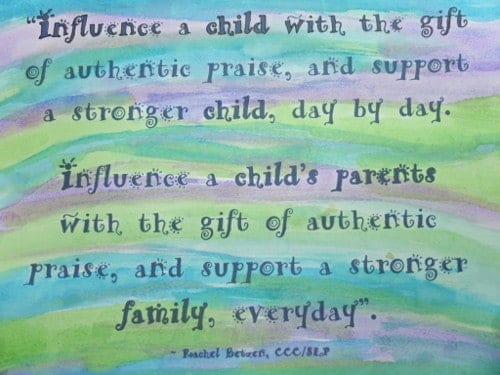By Rachel Betzen, M.S., CCC/SLP
A reflection for our weekly staff meeting and “rounds”
I don’t know who ever tried to catch flies with vinegar, but there really is something to approaching life with a positive outlook. Many people struggle with putting aside the negativity from life’s frustrations or failures, so it’s not really a surprise that our children can get wrapped up in a “negative feedba ck loop”. Children that struggle with communication and academic skills are more likely to get overwhelmed, and this makes it even more of a challenge to stay positive.
ck loop”. Children that struggle with communication and academic skills are more likely to get overwhelmed, and this makes it even more of a challenge to stay positive.
During speech-language therapy we naturally use genuine praise, and judge the mark of a good speech therapist by how well we scaffold learning for our clients and move them through a developmental hierarchy of skill development. It is important for our praise to be both genuine and specific. In this manner, we can boost self-esteem while also providing important feedback on building the speech and language skills we are targeting with their goals.
As speech therapists, we are in a unique position to help bolster and support a stronger attachment with our clients and their parents. We can consider as a practice how we could begin to more directly provide models for parents to praise their children in a specific and genuine manner. Previous studies investigating the effectiveness of parental praise have indicated that it is associated with several elements of positive parenting, including loving and responsive care, supportiveness, warmth, and a positive affect.
Additionally, when we consider children’s outcomes, there is evidence that parental praise influences self-esteem, motivation, emotional and physical well-being, and social competence. “It has also been shown that, as a verbal stimulus, parental praise can influence language development in children. For example, children with language delays typically receive significantly less parental praise than do children with adequate language skills in economically disadvantaged families. Therefore, parental praise is associated with psychological and cognitive development in children”.
Practically speaking, we try to maximize the time we have with children in therapy and leave enough time for parents to sign notes, which makes it hard to set aside more time to give parent updates. Given the potential for good that we can instill in our families with habits of positive praise, this is an important consideration. For our clients that would most benefit, we can try making a “Positive Statements List” and update it with our summaries, or even send “homework” for the parent as well when it comes to praising their child! As we consider how to harness the power of positive parental praise for our clients, we can smile wide, knowing that we are improving their family relationships and laying a foundation for a stronger child and a stronger family unit.
Reference: Parental Praise Correlates with Posterior Insular Cortex Gray Matter Volume in Children and Adolescents Izumi Matsudaira, Susumu Yokota , Teruo Hashimoto, Hikaru Takeuchi, Kohei Asano, Michiko Asano, Yuko Sassa, Yasuyuki Taki, Ryuta Kawashima
PLOS: Published: April 21, 2016 http://dx.doi.org/10.1371/journal.pone.0154220

